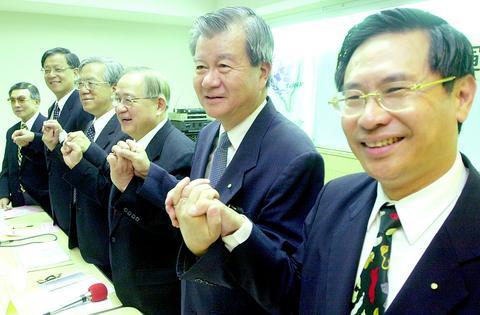Taiwan should apply for full membership in the World Health Organization (WHO) next year instead of requesting observer status, officials of several non-governmental organizations (NGOs) said yesterday.
"Taiwan is already a sovereign state. Whether pushing for observer status or full membership, the bid is a difficult one. Why not fight for full membership?" said Chen Lung-chu (
Key leaders in Taiwan's WHO bid, which was defeated last week -- including Foundation of Medical Professionals Alliance in Taiwan President Wu Shuh-min (

PHOTO: SEAN CHAO, TAIPEI TIMES
Medical Professionals Alliance Executive Director Lin Shih-chia (
"Observer status only lasts six days each year; full membership ensures healthcare benefits all year round," Lin said.
The WHO constitution does not directly define observer status, referring only to the power of the World Health Assembly (WHA) "to invite any organization, international or national, governmental or non-governmental, which has responsibilities related to those of the Organization, to appoint representatives to participate, without right of vote, in its meetings or in those of the committees and conferences convened under its authority."
In recent years, Taiwan has unsuccessfully applied for WHO participation as an observer to the WHA, the organization's highest decision-making body.
"Michael Kau (
However, Maysing Yang (
"While their [the NGOs'] views are on the right track, there are many difficulties that stand in the way," Yang said.
She explained that a lot of progress was made this year, with the US and Japan voting for the inclusion of Taiwan's application in the WHA agenda. Switching gears and calling for full membership could possibly set Taiwan back in terms of US and Japanese support.
"A lot of countries are, for commercial interest among others, afraid to go against China ... politics is higher than international law and human rights in this case," Yang said.
Yang also said that observer status would mean more than just participation in the health body's annual six-day summit, pointing out that observer nations would be invited to other conferences and committees throughout the year.
"It's not bad for them [NGOs] to voice more radical opinions. However, the government needs to take a more practical stance," Yang said.

A preclearance service to facilitate entry for people traveling to select airports in Japan would be available from Thursday next week to Feb. 25 at Taiwan Taoyuan International Airport, Taoyuan International Airport Corp (TIAC) said on Tuesday. The service was first made available to Taiwanese travelers throughout the winter vacation of 2024 and during the Lunar New Year holiday. In addition to flights to the Japanese cities of Hakodate, Asahikawa, Akita, Sendai, Niigata, Okayama, Takamatsu, Kumamoto and Kagoshima, the service would be available to travelers to Kobe and Oita. The service can be accessed by passengers of 15 flight routes operated by

MORE FALL: An investigation into one of Xi’s key cronies, part of a broader ‘anti-corruption’ drive, indicates that he might have a deep distrust in the military, an expert said China’s latest military purge underscores systemic risks in its shift from collective leadership to sole rule under Chinese President Xi Jinping (習近平), and could disrupt its chain of command and military capabilities, a national security official said yesterday. If decisionmaking within the Chinese Communist Party has become “irrational” under one-man rule, the Taiwan Strait and the regional situation must be approached with extreme caution, given unforeseen risks, they added. The anonymous official made the remarks as China’s Central Military Commission Vice Chairman Zhang Youxia (張又俠) and Joint Staff Department Chief of Staff Liu Zhenli (劉振立) were reportedly being investigated for suspected “serious

ENHANCING EFFICIENCY: The apron can accommodate 16 airplanes overnight at Taoyuan airport while work on the third runway continues, the transport minister said A new temporary overnight parking apron at Taiwan Taoyuan International Airport is to start operating on Friday next week to boost operational efficiency while the third runway is being constructed, the Ministry of Transportation and Communications said yesterday. The apron — one of the crucial projects in the construction of the third runway — can accommodate 16 aircraft overnight at the nation’s largest international airport, Minister of Transportation and Communications Chen Shih-kai (陳世凱) told reporters while inspecting the new facility yesterday morning. Aside from providing the airport operator with greater flexibility in aircraft parking during the third runway construction,

American climber Alex Honnold is to attempt a free climb of Taipei 101 today at 9am, with traffic closures around the skyscraper. To accommodate the climb attempt and filming, the Taipei Department of Transportation said traffic controls would be enforced around the Taipei 101 area. If weather conditions delay the climb, the restrictions would be pushed back to tomorrow. Traffic controls would be in place today from 7am to 11am around the Taipei 101 area, the department said. Songzhi Road would be fully closed in both directions between Songlian Road and Xinyi Road Sec 5, it said, adding that bidirectional traffic controls would